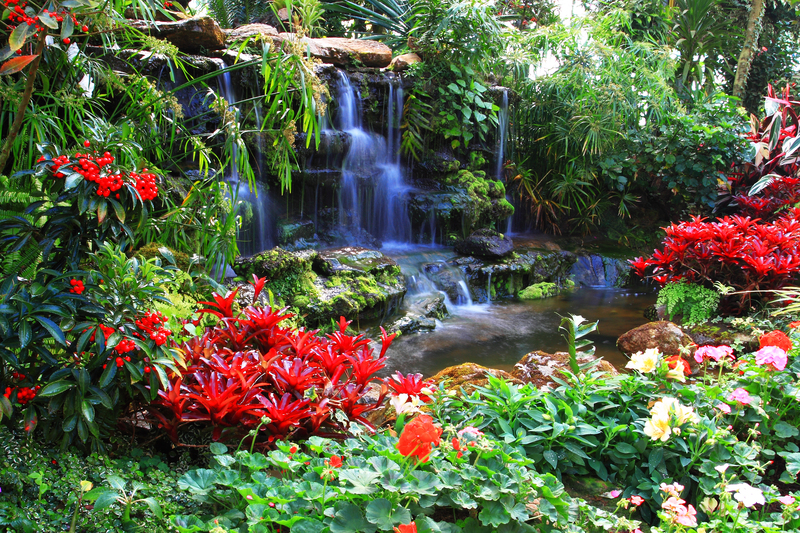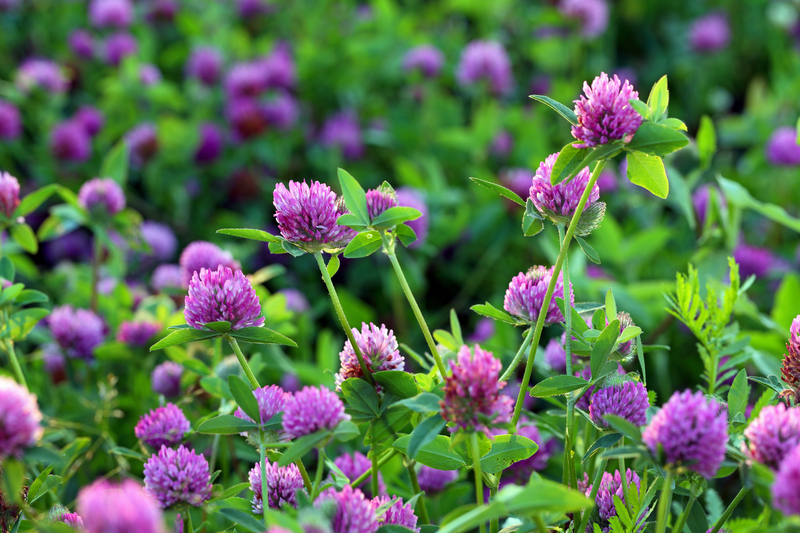Eco-Friendly Container Gardening: Sustainable Solutions
Posted on 16/08/2025
Eco-Friendly Container Gardening: Sustainable Solutions
In today's environmentally conscious world, more gardeners are seeking eco-friendly container gardening methods as a way to nurture plants while reducing their impact on the planet. Sustainable solutions in container gardening not only provide beauty and fresh produce, but also champion the cause of conservation, recycling, and mindfulness. If you're yearning to turn your balcony, porch, patio, or small backyard into a green oasis, this comprehensive guide offers practical insights on cultivating your own eco-friendly container garden.
What Is Eco-Friendly Container Gardening?
Eco-friendly container gardening refers to the practice of growing plants in containers using sustainable gardening techniques. Unlike traditional planting in the ground, container gardening maximizes limited space and adaptability--making it ideal for urban dwellers, renters, and those with mobility challenges. However, by choosing sustainable materials, minimizing resource waste, and practicing organic gardening, you can make your container garden both attractive and environmentally responsible.
Why Choose Eco-Friendly Containers?
- Reduces landfill waste: Choosing reusable or biodegradable containers cuts down on disposables.
- Promotes biodiversity: Sustainable gardening encourages native plants and pollinators.
- Minimizes pollutants: Avoiding synthetic chemicals and plastics keeps your garden and local ecosystem healthy.
- Conserves resources: Smart watering, composting, and upcycling decrease resource use.

Choosing Sustainable Containers for Your Garden
One of the first steps toward sustainable container gardening is selecting the right containers. Avoid single-use plastics and non-recyclable materials. Instead, opt for options that are either natural, biodegradable, or can be reused indefinitely.
Eco-Friendly Container Materials
- Terracotta & Clay: Made from natural earth, these pots are porous and promote strong root growth. They're biodegradable but can crack in freezing temperatures, so bring them in during winter or choose frost-resistant varieties.
- Recycled Plastic: If plastic is your preferred choice, select pots made from recycled materials. These containers are durable, lightweight, and often recyclable at the end of their lives.
- Wooden Planters: Responsibly harvested or reclaimed wood can be fashioned into beautiful, natural-looking containers. Make sure wood is untreated or finished with non-toxic sealants to prevent chemicals leaching into the soil.
- Bamboo: As a rapid-growing, renewable resource, bamboo containers are sturdy, lightweight, and compostable when they reach the end of their use.
- Upcycled Items: Give a second life to old buckets, baskets, boots, or even teapots by converting them into whimsical containers. Upcycling reduces landfill waste while adding charm to your garden.
- Biodegradable Pots: Coir, rice husks, peat, or fiber pots decompose naturally, enriching the soil and eliminating waste.
Tips for Selecting Sustainable Containers
- Check for drainage holes to prevent waterlogging and root rot.
- Choose containers that match your climate and intended plant size.
- Opt for neutral finishes or those colored with eco-friendly, plant-safe dyes and paints.
Earth-Friendly Potting Soil and Amendments
The health of your plants depends largely on the soil you use. Traditional store-bought potting mixes often contain non-renewable peat moss or synthetic fertilizers. For environmentally friendly container gardening, make or purchase organic, peat-free potting soils and incorporate your own natural amendments.
Sustainable Soil Choices
- Coconut Coir: A byproduct of coconut processing, coir is a renewable alternative to peat. It retains moisture and improves soil structure.
- Compost: Homemade or locally sourced compost enriches the soil with nutrients, beneficial microorganisms, and helps reduce household food waste.
- Leaf Mold: Decomposed leaves are an excellent organic soil conditioner and rich in beneficial bacteria.
- Worm Castings: Add worm castings for concentrated organic fertilizer and improved soil fertility.
Organic Amendments for Healthy Plants
- Use bone meal, rock phosphate, or greensand for gradual nutrient release.
- Add crushed eggshells for a slow-release calcium source, especially beneficial for tomatoes and peppers.
- Mulch with straw or shredded leaves to retain soil moisture and suppress weeds.
Water-Wise Container Gardening Solutions
Sustainable gardening places an emphasis on water conservation. Containers can dry out quickly, especially in hot weather, making efficient irrigation crucial.
Smart Irrigation Practices
- Self-Watering Containers: These cunning containers have built-in reservoirs to keep soil moist for longer periods, reducing watering frequency and minimizing runoff.
- Drip Irrigation Systems: A drip hose or gravity-fed system delivers water directly to the soil, where it's needed most, reducing evaporation and waste.
- Water Retentive Amendments: Incorporate water-retaining crystals or biochar into your potting mix to help keep soil evenly moist.
- Collect Rainwater: Set up a rain barrel to capture and reuse rainwater for your container plants--nature's own sustainable irrigation system.
Tips for Water-Efficient Gardening
- Water in the early morning or evening to minimize evaporation.
- Group containers with similar water needs together.
- Use saucers or trays to catch excess water that can be reused for other plants.
Choosing Plants for a Sustainable Container Garden
The plant choices in your eco-friendly patio garden will affect water use, pollinator support, and resource needs. Native plants, drought-tolerant varieties, and edibles are excellent selections for any green-minded gardener.
Best Eco-Friendly Plants for Containers
- Native Flowers: These support local pollinators and are perfectly adapted to your climate. Try wildflowers like coneflowers, black-eyed Susans, or native grasses.
- Herbs: Many herbs, such as thyme, rosemary, basil, chives, and mint, are easy to grow in pots and useful for the kitchen.
- Drought-Tolerant Plants: Succulents, lavender, and ornamental grasses require little water and thrive in containers.
- Vegetables: Tomatoes, peppers, lettuce, radishes, and kale are perfect for container gardening, giving you fresh, home-grown produce.
- Fruit Bushes: Blueberries, strawberries, and dwarf citrus perform well in larger pots.
- Climbing Plants: Beans, peas, and passionflower make excellent use of vertical space, especially when trained on trellises.
Selecting Pollinator-Friendly Plants
- Plant a mix of flowers that bloom from spring through fall to sustain bees and butterflies year-round.
- Avoid pesticides, especially those containing neonicotinoids, which harm beneficial insects.
Natural Fertilizers and Pest Management
In sustainable container gardening, chemical fertilizers and pesticides have no place. Instead, bolster plant health with organic fertilizers and practice integrated pest management (IPM) for a resilient garden ecosystem.
Eco-Friendly Fertilizers
- Homemade compost tea or worm tea provides a gentle nutrient boost.
- Fish emulsion, seaweed extract, and organic manure are safe and effective fertilizers.
- Use slow-release organic pellets to keep feeding balanced over time.
Organic Methods to Control Pests
- Encourage beneficial insects such as ladybugs and lacewings by planting nectar-rich flowers.
- Hand-pick harmful bugs or use soft streams of water to dislodge aphids.
- Apply neem oil or insecticidal soap sprays if infestations persist.
- Rotate crops and provide healthy soil to prevent disease and pest buildup.
Upcycling for Sustainable Garden Accessories
Another creative aspect of eco-friendly potted gardening is reusing materials for plant supports, markers, and decorations. Reinventing discarded goods not only saves resources but personalizes your green space.
Ideas to Repurpose Household Items
- Plant Markers: Use old spoons, sticks, broken terracotta shards, or wine corks as labels.
- Trellises & Supports: Fashion stakes from pruning cuttings, old furniture, or coat hangers.
- Watering Cans: Repurpose milk jugs, kettles, or soda bottles for irrigation.
- Mulch: Shred old newspapers or cardboard boxes as eco-friendly mulch.
Composting for Container Gardens
Composting is the backbone of most sustainable container gardening solutions. Even with limited space, you can establish a worm bin, bokashi bucket, or mini compost tumbler on your balcony or beneath the kitchen sink.
How to Compost in Small Spaces
- Vermicomposting: Red wigglers break down food scraps, producing nutrient-rich vermicompost perfect for top-dressing container plants.
- Bokashi Buckets: An anaerobic system that uses inoculated bran to ferment all types of food waste, including dairy and meat.
- Mini Compost Bins: Lidded bins or tumblers can be tucked out of sight, transforming kitchen and garden waste into organic fertilizer.
Sustainable Gardening Habits
A truly eco-friendly gardening approach isn't limited to materials and products; it's a philosophy of stewardship. Cultivate green habits as you grow:
- Purchase seeds and plants from local nurseries to minimize transportation emissions.
- Share excess seedlings or produce with neighbors, or organize a seed swap.
- Maintain your garden organically--hand weed, mulch, and monitor for problems frequently.
- Reconnect plastic pots with nurseries or community gardens for reuse or proper recycling.
- Support environmental organizations and campaigns to protect pollinators, soil, and clean water.

FAQs About Eco-Friendly Container Gardening
Can you practice sustainable gardening even in small spaces?
Absolutely! Eco-friendly gardening in containers is designed for balconies, small patios, or even window sills. Sustainability is more about your methods and materials than the size of your space.
Is it more expensive to garden sustainably?
It doesn't have to be. Upcycling containers, making your own compost, and growing from seeds can actually save you money compared to buying new supplies and chemical products.
How do I keep pests away naturally?
Use companion planting (like marigolds with tomatoes), encourage natural predators, hand-pick invaders, and use safe organic sprays only as a last resort.
Are peat-free soils effective in containers?
Yes! Peat-free soils made from coconut coir, compost, and other organic matter hold moisture well and provide nutrients--without the environmental damage of peat extraction.
Conclusion: Create an Eco-Conscious Oasis
No matter your skill level or available space, eco-friendly container gardening invites you to enjoy horticultural creativity while treading lightly on the earth. By selecting sustainable materials, nurturing healthy organic soil, conserving water, and supporting local biodiversity, your containers can become miniature eco-systems. Transform your urban dwelling or backyard into a sustainable sanctuary--one container at a time.
Ready to start your own sustainable container gardening project? Gather some upcycled pots, fill them with rich, organic soil, and choose a variety of pollinator-friendly plants. Every green step you take brings us closer to a cleaner, healthier planet for generations to come.
Happy eco-friendly gardening!
Latest Posts
How to Shield Your Garden from Weather-Related Damages
Innovative Concepts for Cozy Garden Seating Arrangements
Transform Walls into Gardens with Vertical Gardening

